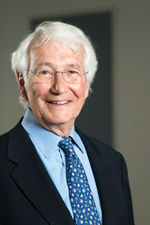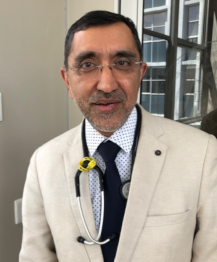The African Microbiome Institute (AMI)
Governing Board
 Prof. Stephen O’Keefe, Director of the African Microbiome Institute (AMI) is an internationally renowned researcher with some forty years’ experience in nutritional gastroenterology. He also has an appointment at the University of Pittsburgh, where he holds a position as Professor of Medicine in the Division of Gastroenterology and Nutrition. He was born in Johannesburg and raised in Zambia where his interest in nutritional medicine was kindled by visits during school holidays to rural health clinics with his father, a doctor in the health service. “It was on these trips that I saw how nutrition was one of the key things that affected health,” he says. This interest lead to training in Medicine (Guy’s Hospital, London) and Human Nutrition (London School of Hygiene and Tropical Medicine), followed by Internal Medicine and Gastroenterology at Oxford and King’s College Hospital, and a fellowship in Nutrition at Harvard and the Massachusetts Institute of Technology. After completing his training in gastroenterology, he returned to Africa, first working at King Edward 8th Hospital in Durban, followed by Groote Schuur Hospital in Cape Town.
Prof. Stephen O’Keefe, Director of the African Microbiome Institute (AMI) is an internationally renowned researcher with some forty years’ experience in nutritional gastroenterology. He also has an appointment at the University of Pittsburgh, where he holds a position as Professor of Medicine in the Division of Gastroenterology and Nutrition. He was born in Johannesburg and raised in Zambia where his interest in nutritional medicine was kindled by visits during school holidays to rural health clinics with his father, a doctor in the health service. “It was on these trips that I saw how nutrition was one of the key things that affected health,” he says. This interest lead to training in Medicine (Guy’s Hospital, London) and Human Nutrition (London School of Hygiene and Tropical Medicine), followed by Internal Medicine and Gastroenterology at Oxford and King’s College Hospital, and a fellowship in Nutrition at Harvard and the Massachusetts Institute of Technology. After completing his training in gastroenterology, he returned to Africa, first working at King Edward 8th Hospital in Durban, followed by Groote Schuur Hospital in Cape Town.
He has subsequently spent nearly 30 years in the USA working as a clinical gastroenterologist and scientist supported by NIH R01 awards in his subspecialties of pancreatitis, malnutrition, and most recently the human microbiome. His collaboration with South African, British, Dutch, American and Alaskan researchers has led to novel findings on colonic microbiome that explain why rural Africans rarely get colon cancer whilst African Americans suffer the highest incidence in the continental USA and Alaska Native people have the highest recorded rate of colon cancer in the world. Key findings have been published in
Nature Communications and Nature Reviews.
References >
 Professor Nicolaas Claudius (Nico) Gey van Pittius VI
Professor Nicolaas Claudius (Nico) Gey van Pittius VI is currently the Vice Dean of Research in the Faculty of Medicine and Health Sciences, and a Full Professor of Molecular Biology and Human Genetics in the Department of Biomedical Sciences at Stellenbosch University. He is also a core member of the Department of Science and Technology (DST)/National Research Foundation (NRF) Centre of Excellence in Biomedical Tuberculosis Research (CBTBR) and the Medical Research Council Centre for Tuberculosis Research (CTR) hosted by Stellenbosch University.
After obtaining his BSc (cum laude), BScHons (cum laude) and MSc degrees from the University of Potchefstroom (UP), and his PhD degree from Stellenbosch University (Stell), he spent some years as a Postdoctoral Research Fellow, before being appointed Senior Researcher, later Associate Professor, and finally Full Professor in the Department of Biomedical Sciences of Stellenbosch University.
He continued studying part time while working, obtaining a certificate in Intellectual Property Law (cum laude) and an LLB degree (cum laude) from the University of South Africa (UNISA), and the degrees LLM and MBA from Stellenbosch University. He is currently completing an MPhil degree in Science and Technology Studies at the same institution. He is an NRF B-rated researcher and was elected to membership of both the ‘Suid-Afrikaanse Akademie vir Wetenskap en Kuns’ (in 2006 at the young age of 33 years) and the Academy of Science of South Africa (ASSAf) (in 2010, at the age of 37 years). He is also a member of several other national and international scientific societies and committees, such as the American Society for Microbiology (ASM) and the International Union against Tuberculosis and Lung Disease (IUATLD).
Prof Gey van Pittius is a molecular mycobacteriologist who has worked on tuberculosis for more than 20 years, specifically focusing on the mechanisms of evolution of the mycobacteria and the development of mycobacterial pathogenicity and drug resistance. He has co-authored close to 100 papers and book chapters on various aspects of tuberculosis, with over 3 700 citations (and a current Scopus h-index of 35) and is a co-inventor of two granted and three provisional patents in the field. He has supervised numerous postgraduate students over the years and taught postgraduate modules in intellectual property law, bioinformatics, genomics and genome variation. His work has been presented in oral and poster form at more than 40 international and nearly 100 national conferences and meetings, and he has been invited to present lectures at numerous institutions worldwide.
 Prof Rafique Moosa
Prof Rafique Moosa, is currently the Executive Head of the Department of Medicine at Stellenbosch University since 2006. Obtained his MB ChB (cum laude) and FCP (SA) degrees at the University of Cape Town. Thereafter he pursued his studies and completed his MD degree at Stellenbosch University. He also obtained his FCRP degree at the Royal College of Physicians, London. He served as Senior Consultant / lecturer and specialist physician / nephrologist after which he was promoted to Principal specialist and Associate Professor of Medicine (4years).
He has published >10 papers.
 Prof Florian Bauer
Prof Florian Bauer, born in Germany, pursued his tertiary education in Germany and France and obtained a Ph.D. in Life Sciences at the University of Bordeaux II in 1993. He currently holds the position of South African Research Chair in Integrated Wine Science and of Distinguished Professor in Wine Biotechnology at Stellenbosch University. The position is based at the Institute for Wine Biotechnology, which is part of the Department of Viticulture and Oenology in the Faculty of AgriSciences.
His research focuses on wine-relevant aspects of yeast physiology, genetics and molecular biology, including the regulatory networks that control gene expression and metabolism, cell wall properties, microbial biodiversity and the ecological and molecular interactions between wine microorganisms. More recently, the research focus has shifted towards investigating the dynamics of wine-associated microbial ecosystems, the application of synthetic ecology and the integration of new data analysis tools in the Sensory and Consumer Sciences.
Research data have been published in more than 80 peer-reviewed articles and in several book chapters. He has been invited to present numerous keynote, opening or plenary lectures at international and national conferences, and is a member of the Editorial Boards of Yeast, FEMS Yeast Research, BMC Microbiology and the South African Journal of Enology and Viticulture. 23 Ph.D. and 31 M.Sc. students have graduated under his supervision.
 Prof. H Patterton
Prof. H Patterton has a PhD in Biochemistry from the University of Cape Town (1991) and post-doctoral training at the National Institutes of Health and at Pennsylvania State University. He is currently Director of the Centre for Bioinformatics and Computational Biology (CBCB) at Stellenbosch University. His main research area is Epigenomics, which is the genome-wide study of chromatin structure, histone modifications and DNA methylation, and its role in DNA function. He was responsible for setting up an under-graduate stream and post-graduate degrees in Bioinformatics and Computational Biology at Stellenbosch University, and maintains an active research group in the CBCB.

